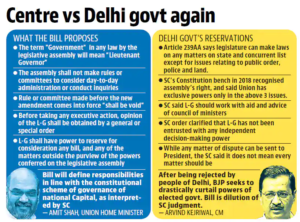In news : Recently, the Union government Government of National Capital Territory of Delhi (Amendment) Bill, 2021 in Lok Sabha
Key provisions of the bill
- Lt. Governor’s upper hand: The proposed bill makes it necessary for Delhi government to obtain the opinion of the lieutenant governor before taking any executive action and it forces the elected government to take the L-G’s advice before taking any action on any cabinet decision.
- Statement of objects & reasons of the bill: The Union government claims that the amendment Bill seeks to give effect to the Supreme Court’s interpretation and that it “further defines” the responsibilities of the elected government and the Lt Governor in line with the Constitutional scheme
- Meaning of government: In its proposed amendments the bill mentions that the term “government” in any law made by the Legislative Assembly shall mean the L-G. It gives effect to former L-G Najeeb Jung’s 2015 assertion that “Government means the Lieutenant Governor of the NCT of Delhi appointed by the President under Article 239 and designated as such under Article 239 AA of the Constitution”
- Making rules: it seeks to add a provision in the original GNCTD Act, 1991, barring the Assembly or its committees from making rules to take up matters concerning day-to-day administration, or to conduct inquiries in relation to administrative decisions.

What was the verdict of the Supreme Court in 2018?
- The Apex Court’s five-judge Bench had held that the L-G’s concurrence is not required on issues other than police, public order and land.
- It had added that decisions of the Council of Ministers will, however, have to be communicated to the L-G.
- The Court had ruled that “It has to be clearly stated that requiring prior concurrence of the Lieutenant Governor would absolutely negate the ideals of representative governance and democracy conceived for the NCT of Delhi by Article 239AA of the Constitution,”
- It had also said that the L-G was bound by the aid and advice of the council of ministers
- The Supreme Court bench had said that the status of the Lieutenant Governor of Delhi is not that of a Governor of a State, rather he remains an Administrator, in a limited sense, working with the designation of Lieutenant Governor
- It had also pointed out that the elected government must keep in mind that Delhi is not a state.
- The SC had also categorically pointed out that the L-G “should not act in a mechanical manner without due application of mind so as to refer every decision of the Council of Ministers to the President
Effects of the proposed bill
As per the 2018 verdict of the Supreme Court, the elected government of Delhi had stopped sending files on executive matters to the L-G before the implementation of any decision. It has been keeping the L-G abreast of all administrative developments, but not necessarily before implementing or executing any decision. But the amendment, if cleared, will force the elected government to take the L-G’s advice before taking any action on any cabinet decision.
Government of NCT of Delhi Act 1991
- The status of Union Territory with a Legislative Assembly of Delhi is an outcome of the 69th Amendment Act through which Articles 239AA and 239BB were introduced in the Constitution.
- This act was passed to supplement the constitutional provisions relating to the Assembly and the Council of Ministers in the national capital
- It outlines the powers of the Assembly, the discretionary powers enjoyed by the L-G, and the duties of the Chief Minister with respect to the need to furnish information to the L-G.
- Section 44 of the act deals with conduct of business and there is no structural mechanism provided in the act for effective time bound implementation of said section.
Powers of Lt Governor of Delhi Lt Governor of Delhi have the power to refer any matter, over which there is a disagreement with the elected government, to the President under Article 239AA(4).
















